Can Reporters Have Friends?
A new book raises fundamental questions about how far journalistic objectivity should extend.
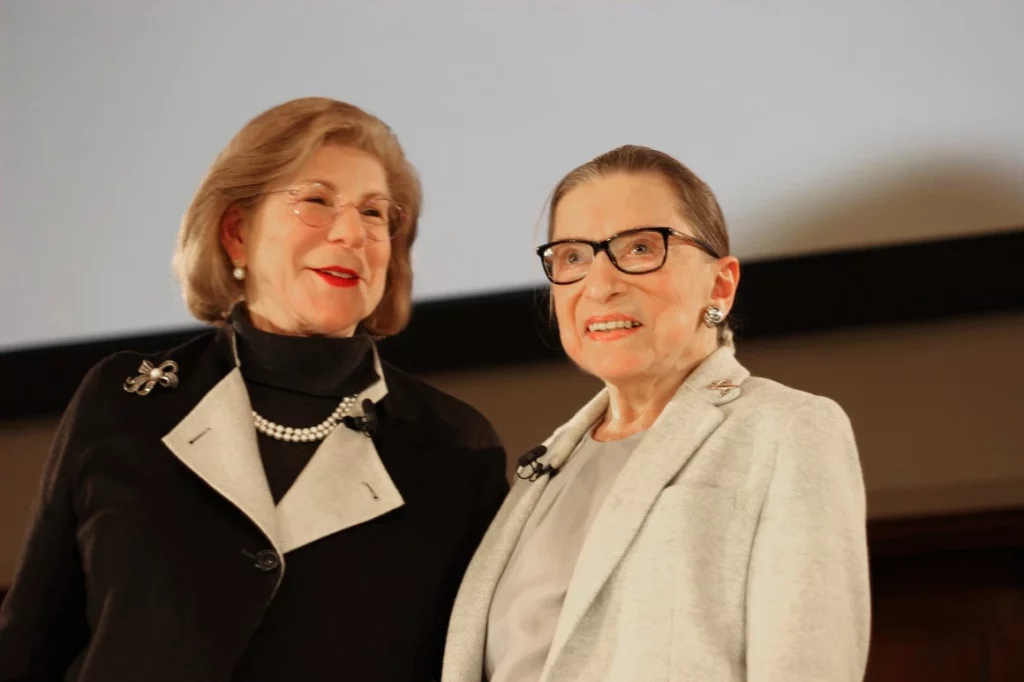
POLITICO’s Michael Schaffer is rather harsh in his assessment, “Nina Totenberg Had a Beautiful Friendship With RBG. Her Book About It Is an Embarrassment.” Indeed, he accuses the longtime NPR court watcher of journalistic malpractice.
Did Nina Totenberg know a secret that could have changed history?
The question hovers over Dinners With Ruth, Totenberg’s new memoir of her four-decade friendship with Ruth Bader Ginsburg, complicating the chronicle of the pair’s triumphs and sorrows, lingering in the air like the fishy aroma of the bouillabaisse Totenberg used to bring to the ailing justice.
It’s a question whose implications — for women’s rights, the Constitution, the future of the republic — are more important than the by now familiar debate over whether a National Public Radio reporter’s controversial ties to a powerful jurist she covered violated journalism-school best practices.
Let’s get this out of the way early: I agree that Totenberg should have been more forthright about her incredibly close personal relationship with a person on whom she regularly reported.
It was 2020, an election was looming, and RBG was dying. During lockdown, we learn in the book, Totenberg’s home was the one place Ginsburg went other than her own apartment. Their weekly Saturday suppers made Totenberg one of the few Americans to lay eyes on the justice during the months of isolation. By July, Ginsburg could not climb the six steps into the house without a bodyguard holding her around the waist. At her apartment, she fell asleep midmeal, a fork still in her hand. She wore clothes meant to disguise how much weight she’d lost. Her gloves — which had become a fashion statement — were actually there to cover the IV wounds on her hands.
After a hospital stay, she confessed, for the first time, that she had thought she was going to die there.
Anyone who has watched a loved one fade understands how you can just know, even before you admit it to yourself. “I kept thinking, ‘C’mon, Ruth, you can do it, you can do it,'” Totenberg writes, referencing a scare right before Covid struck. “But I was enough of a realist that I would also wake every morning worrying about her.” As 2020 progressed, the reality became clearer still. “In the beginning, I had conned myself into thinking that there was every reason to believe Ruth would survive this. But as the months rolled on, it became clear that this illness wasn’t just lung cancer. It was a return of the old pancreatic cancer,” one of the deadliest forms of the disease.
What if Totenberg had gone on the air to lay out what she knew?
Two things. First, it would have made no difference whatsoever. Donald Trump was President and would be until noon on January 20 the next year; it was too late for Ginsburg to retire. Second, it would have been an egregious violation of personal trust.
Indeed, Schaffer acknowledges the latter point but brushes it off because disagrees with the first:
It would, of course, have required either some persuasion or an act of betrayal. But there’s a chance that a blunt story about Ginsburg’s decline might have changed the trajectory that led to the end of Americans’ right to abortion. As competitors’ sensationalist stories focused on Ginsburg’s health, activists might have gotten GOP senators (many of them locked in tight elections) on the record promising to not fill the seat until after the voters had a say in the November presidential election. The lurid coverage would surely have undercut the element of surprise that enabled Mitch McConnell to move almost immediately to muscle through a replacement.
This is sheer fantasy. There was no stopping Trump from appointing a successor and the Republican-majority Senate from rapidly confirming her.
Now, Totenberg’s book prompts a new counterfactual that boils down to this: What if she’d been a more single-minded journalist and a lousier friend?
“At different moments in life, there are choices of lasting consequence,” she writes in the book, describing her feelings as Ginsburg’s health turns. “And I had one of those before me. For the next eighteen months, I chose friendship. It was the best choice I ever made.”
Again, I think Totenberg should have been more forthcoming about the nature of the relationship. And I have a longstanding objection to reporters withholding important news that they gathered while reporting for their employers so that they’ll have juicy tidbits for their books. But this strikes me as something altogether different.
She didn’t have a journalistic or societal obligation to report on her private meetings. I can’t imagine the relationship—which long predated Ginsburg’s appointment to the Supreme Court—didn’t come from the tacit understanding that their private conversations were off-the-record. Beyond that, personal trust is a higher value than adding color to what we already knew: the 87-year-old Justice was quite ill.
Totenberg, now 78, dismisses the idea that she had much to add to the public record during the year and a half before Ginsburg’s death. There was no big news she sat on. She told me this week that she didn’t know until summer just how bad it was. “When she started coming to the house eight months before that, she was looking pretty decent in those days,” she says. Totenberg only really knew, she says, when she stopped at her sister’s house on summer vacation and saw a video of RBG at a memorial event for a recently deceased federal judge. She was wearing a shawl and holding it out to disguise the fact that she’d lost even more weight.
And once the court, in its typically dry way, acknowledged pancreatic cancer around this same time (“the tumor was treated definitively and there is no evidence of disease elsewhere in the body,” the statement said) she says the whole press corps understood. “All of us who cover the court, everybody knew,” Totenberg says. “It was a question of how long.” Even if they’d all written over-the-top stories about it, she says, no amount of news-driven maneuvering could have dissuaded Mitch McConnell from getting a conservative replacement seated.
Agreed on both counts. But Schaffer ultimately believes that reporters are reporters and only reporters.
I don’t think Totenberg was BSing me. But it’s clear on every page of Dinners With Ruth that the reporter deeply loved the judge, a woman who had comforted her in widowhood and celebrated her new marriage and taught her much about what it means to show up for your friends. The thing about love is it can make you not want to see stuff that’s right before your eyes. That tendency is hard to square with a reporter’s job. And when you’re a powerful reporter covering things that shape the life of a country, the matter of how you do your job is a lot more important than one lovely friendship or some quasi-academic debate about a journalist’s true duties.
As with most things, it depends. Again, the fact Ginsburg had yet another cancer relapse was a matter of public record. It’s not at all clear what greater good would have been served for Totenburg to contribute lurid reports of just how bad she looked.
Ultimately, though, Schaffer’s critique is more fundamental and goes beyond Totenberg:
Which brings us back to Totenberg’s confounding book, subtitled “A memoir on the power of friendships,” but actually a remarkable tour of how the connected Washington mind works.
The tome does double duty as a sometimes rollicking account of Totenberg’s ground-breaking journalistic career and a heart-tugging chronicle of the various Washington VIPs she befriended. It has some great stories — about the grotesque sexism of media and politics during the early years of her career; about the workplace racism she uncovered in her 1970s-era reporting on mistreatment of Supreme Court janitorial staff; about how she got the story of Anita Hill and Clarence Thomas — but it always comes back to friendships, starting with the story of how a twentysomething Totenberg invited Justice Lewis Powell and his wife for dinner, and continuing on through stories of how Totenberg and her work sisters Cokie Roberts and Linda Wertheimer advocated for younger women journalists at the nascent NPR.
They’re very sweet, all these tales of fundamentally decent people who have your back amidst grief and triumph alike. But as the pages go by, and Totenberg and her friends become more powerful, the theme becomes increasingly uncomfortable — and increasingly revealing.
It’s not that Totenberg pulls punches on the insiders who come to her dinners. She has a code, and while it might not be good enough for journalism-ethics busybodies (like the NPR ombudsman who scolded her for not revealing her RBG friendship), I’m willing to believe she keeps to it. Rather, it’s the way she seems to accept and share her insider friends’ worldviews. In this universe, it seems, we’re all on the same team.
The jurists Totenberg spent her career covering, for instance, are invariably portrayed as thoughtful stewards of the Constitution, even when they err. In the months since the end of Roe v. Wade, it’s become fashionable to think of the court as a blatantly political body. If you’re wondering why it took America so long to get to that conclusion, even as leaders of other once-admired institutions were exposed as hacks and nincompoops, look no further than Totenberg’s dinner table, where the likes of Nino Scalia (“a mensch”), Stephen Breyer (he and his wife helped clean up after an I Love Lucy-style dishwasher disaster) and William Brennan (he wrote a thoughtful note to Totenberg’s niece) were holding court.
This is a fair argument and one to which my reaction is mixed. On the one hand, it’s rather odd that a reporter is so chummy with so many of the personalities she covers. On the other, it almost certainly gives her far better insights into the character and motivation of the Justices than those who simply read the opinions.
In many ways, this is a throwback to an older era of journalism in those days before Vietnam and Watergate made the relationship between reporters and those they cover so adversarial. These days, it’s simply inconceivable that a press corps could hide such obviously salient facts as President Roosevelt being confined to a wheelchair or President Kennedy sneaking out of the White House to have affairs. The public had a right to know those things.
But the pendulum has swung too far in the other direction. Public figures, even important policymakers like Presidents and Supreme Court Justices, ought to have some modicum of privacy. And, while the old timers took it too far in actively hiding information from the voters, there’s value in reporters being inside the circle of trust to gain a deeper understanding of the complexities of the issues decision-makers face. The only way that can happen is if politicians know they can let their guard down a bit without every embarrassing detail hitting the press.
And, of course, Ruth, as the book always calls her, the most admirable of all. One theory about Ginsburg’s decision to stay on the court was that, sharp as she was, she lived in a bubble that left her unable to appreciate how mean and extreme politics had become. If so, the convivial vibe depicted by Totenberg didn’t do much to clear things up. In fact, Totenberg became part of the RBG hype machine. As the justice became an unlikely celebrity, she and Totenberg developed a sort of stage act, conducting public interviews before ticketed audiences. Totenberg would share questions in advance. The responses were more thoughtful that way, which it seems was really what the evenings were trying to show.
I have no objection to sharing questions ahead of time to solicit more thoughtful answers. Hell, that’s what I do when I host public interview sessions. It’s better for everyone involved. The expert doesn’t get embarrassed and the audience gets the full value of the expertise.
That said, it’s a weird role for a reporter to play and especially problematic if the audience isn’t in on the chumminess of the relationship.
With its odd, priestly culture, the court is particularly susceptible to this sort of veneration. Could you imagine a congressional reporter doing a book called Dinners With Harry Reid, tracing shopping excursions and intimate family moments with the late majority leader, who died the year after Ginsburg? I’m not saying Totenberg has to treat the justices as if they were venal, low-wattage members of the Palookaville ward-politics machine. But it’d be nice if she held open the possibility — a hard thing to do when you’re pals.
But Totenburg isn’t a star-struck cub reporter. She’s been in the business six decades, nearly five of them with NPR. Her late first husband was a United States Senator. Presumably, she saw Scalia and company as decent, brilliant people because she knew them pretty well and that’s how they presented themselves in her company.
As the old journalistic adage goes, if your mother tells you she’s just a humble jurist calling balls and strikes, check it out.
In one particularly excruciating passage, the Scalias come to a dinner party shortly after the conservative justice wrote the precedent-shattering decision striking down D.C.’s gun laws. Totenberg’s husband, a surgeon who she says has operated on hundreds of gunshot victims, adorns every guest’s soup bowl with a plastic squirt gun. Everyone laughs. Hilarious!
So, okay, that seems weird shorn of context. But, even in Washington, not everything is politics. Scalia and Ginsburg were famously fast friends despite their disagreement on so many issues. It’s quite possible to dislike someone’s legal philosophy or decry the public policy impact of their decisions and like them as people. The fact that so many can’t do that anymore is a big part of why our politics are so broken right now.
Indeed:
Totenberg’s book seems to be cast as a corrective against some national misapprehension that Washington is about nothing but bickering and partisanship. But that misunderstands why so many Americans are down on the capital. Instead, the rage stems from a conviction that the city is full of insiders who are all part of the same contented club, forever scratching one another’s backs. That’s a perception that Dinners With Ruth does absolutely nothing to dispel.
It’s so much better now that politics is seen as civil war by other means.
When we spoke, Totenberg waxed nostalgic about the old Washington of cross-aisle comity. “It was an incredibly different time and it was a better time,” she says. Today, “it’s better than people think it is, because there are people who are still friends even though they don’t advertise that. And there are people who still work together even though they don’t advertise that. But it’s much worse than it used to be.”
Partly, that’s a function of our sorting and polarization. There’s simply much less seeing eye-to-eye than there was even a decade or so ago. And, Republicans, in particular, are increasingly sending mean-spirited lunatics to Washington.
Totenburg and I mostly agree here:
Totenberg would also not concede an inch to the critics of her friendships. Of Kelly McBride, the NPR Public Editor who wrote soon after Ginsburg’s death that Totenberg should have done more to disclose their relationship, she says, “I am not the only reporter at NPR who thinks that she has a completely unrealistic view of covering Washington.” What would a realistic view entail? “Think about Washington, D.C., itself and the professions that operate here. There are lawyers and lobbyists. There are politicians and policy people. And reporters who cover it all. And the reporters shouldn’t be divorced from all of that. We should know them.”
Now, again, if you’re a reporter, it’s important to disclose conflicts of interest. It would be unreasonable to expect her to have noted everyone she ever had dinner with in her reporting. That she and Ginsburg were best friends is something that we should have known.
Hard to argue with that. But “know” is a complicated concept, one that friendship can deepen but also occlude.
If Totenberg were an architect or a history professor or an airline pilot or an actuary, the emotional blind spots would be her business. But she’s a reporter, a very influential one. Which means that those of us who have relied on her reporting but didn’t experience the heartwarming calls or the gossip-filled evenings are within our rights to apply a certain selfish cost-benefit analysis: What exactly do we get out of her friendships? Totenberg says that intimacy with justices and public officials made her a more thoughtful reporter and a better person. I’ll buy it. Yet even if you don’t think any amount of scary Ginsburg-health reporting could have deterred Mitch McConnell in 2020, it’s hard to come away from this book and not think the bonds also cost her something — and us, too.
Harry Truman famously said that if you want a friend in Washington, get a dog. The phrase is usually meant as a cautionary tale — that humans, in a town of ambition, will eventually let you down. Totenberg’s book, with its tales of steadfastness and solidarity, disproves that line. But the phrase could also be read as advice. Maybe it means that following true north requires a distance that’s made much more difficult by genuine friendship. Which is all just to say that Dinners With Ruth left me wondering whether it would have been better if Nina Totenberg had gotten a dog.
I’m not convinced.
Maybe journalists, and especially reporters, shouldn’t be friends with those they cover. It can potentially create divided loyalties that make it harder to tell hard truths. But it’s not at all clear that happened in this case.

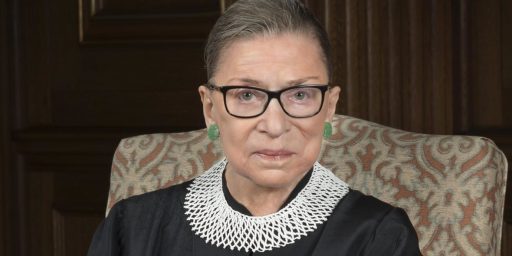
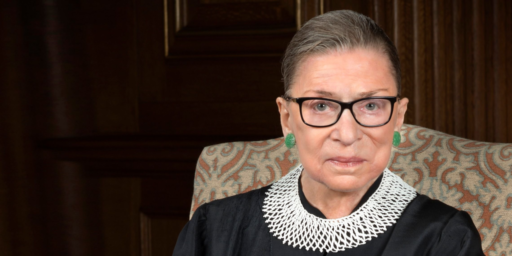
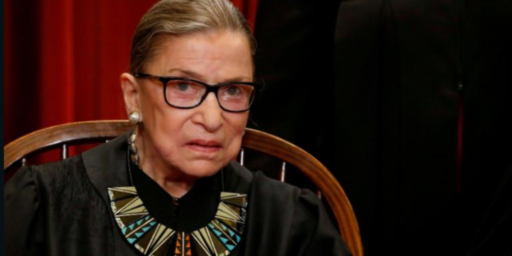
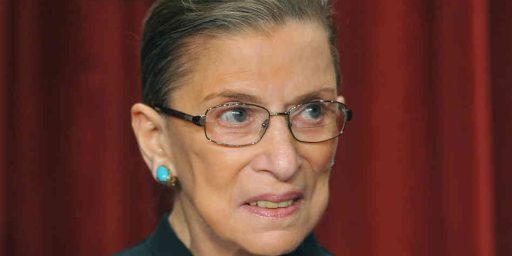
I don’t think that’s quite right. I don’t ever remember Totenberg doing much, if any, reporting on the justices themselves, barring when they were in contention for being appointed. She reports on Supreme Court cases and their effects.
In other words, she is the polar opposite of Cokie Roberts, who was basically a political gossip columnist.
I found this a far better explanation of what’s wrong with Totenberg’s “reporting”:
Book Review: ‘Dinners With Ruth’ and Without Any Semblance of Journalistic Standards, By Nina Totenberg
The details of Ginsburg’s personal life isn’t the issue. The issue is that Totenberg has been pulling punches on all of the SCOTUS justices because she values their hurt feelings at being criticized as being more important than the millions of lives of anonymous “little people” damaged by their decisions.
Somewhere along the way, Totenberg stopped being a journalist and turned into the court’s PR department.
@Stormy Dragon: I’m sure if you want to read about the personal lives of the Justices and their infighting there are many sources. But that’s not Totenberg’s beat and never has been. I, for one, appreciate the straight reporting on the cases and am happy she avoids the gossip.
@Stormy Dragon:
There you get at something very basic and very true. Our elites, the real elites, not the associate professors and rappers and BLM activists, see themselves as the country. And the journalists at the edge of the elite see their role as selling the views of the elites to the sheep. The Ginsburg/Totenberg thing is a not particularly harmful example of a deeply harmful system.
The elites see it as themselves against the rest of us, who might want to tax them or take away some of their power. The rest of us develop a reciprocal us versus them attitude. Which our elites have managed to distort into being against the professors and rappers and activists. When the MAGAts say they’re victims of the elites, they’re right. But their understanding of the situation and their solutions are badly flawed.
When asked why he seemed more accurate than many pundits, Dr. Krugman responded that it wasn’t because he was smarter, it was because he could rely on public data. He didn’t have or need insider contacts, so he wasn’t being manipulated by them or owe them anything.
@MarkedMan:
My complaint is that she hasn’t actually stuck to straight reporting. She’s more concerned about whether we appreciate Scalia’s legal brilliance and deep intelligence rather than the fact his Heller opinion is why we’re being swarmed with mass shootings.
@Stormy Dragon:
That’s my issue: not that Totenberg needs to be dishing about the details of Scalia’s private life, but that the closeness of their relationship seems to have caused her to forget that this isn’t just some dinner party debate with her Republican uncle that has no bearing on the wider world, but people casually making decisions that effect millions of lives
As is not particularly unusual for me, I’m going a completely different direction. On Tottenberg, correct all around–she shouldn’t have placed herself in such a situation and the state of RBG’s health and its relationship to pushing her to retire probably didn’t matter after about 2013. The real question is RBG’s relationship with a member of the press who reports on her.
Shouldn’t Ginsberg have been recusing herself at every decision where discussions of the topic may have come up–at the time or in the past, either one–out of a concern that Ginsburg’s impartiality may have been compromised? I would say ‘yes,’ but it may depend on whose team you support.
How bout it, folks? Am I just being a cracker, or do I have a point? Is recusal only for Clarence Thomas?
James, “Can Reporters Have Friends?” is a strawman.
@Barry: Headlines are seldom able to capture the nuances of the argument. I don’t believe the lengthy post that follows miscast Schaffer’s argument.
@Just nutha ignint cracker: I’m not sure I follow the question. Should she have recused herself if the case involved Nina Totenberg directly? Absolutely. But as you get further and further away from a best friend, the answer is fuzzier. Supreme Court members are humans, who we would assume have friends.
In the case of Clarence Thomas, there may be(and already was) a case that directly involved his wife. Maybe, giving him the benefit of the doubt, he didn’t know that, since all the reporting I’ve read on her makes her and her attempts to influence the election results sort of pathetic, but if he did know, he absolutely should have recused himself.
I mean, it’s been argued that Chief Justice Rhenquist voted in surprising ways in some cases because he had a daughter that was divorced, and had seen first hand what it took to be a single mother. Should he have recused himself from all of those cases? I’d argue not.